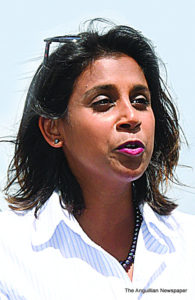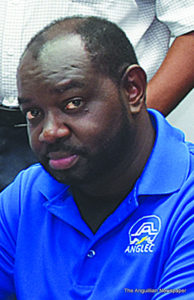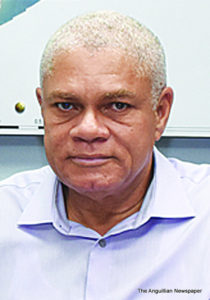
The Chairman of the Board of the Anguilla Electricity Company Limited (ANGLEC), Mr Pat Mardenborough, and its Chief Executive Officer, Mr Sutcliffe Hodge, were summoned to appear before the National Security Council on Tuesday, September 6, 2022, to discuss issues pertaining to ANGLEC as a potential threat to Anguilla’s national security.
Mr Mardenborough and Mr Hodge participated in a call-in interview with Klass FM 92.9 DJ Hammer on Wednesday morning to share information with the listening public about the meeting and to add clarity to issues involving ANGLEC and the Government of Anguilla.
Chairman Mardenborough noted his surprise at being called to a national security meeting and the accusation that ANGLEC could be considered as a security threat to Anguilla.
“I was quite surprised with receiving the letter and with the nature of the letter saying that we (ANGLEC) were a risk to the national security of Anguilla. All we have ever done since joining the Board was to ask the government to live up to its obligation to the company, and at no point in time have we come on radio and said we could not supply electricity to our consumers. The only consumers that were interrupted are those who have had outstanding balances on their accounts.
“I could see where this [meeting] was going, since the Water Corporation of Anguilla (WCA) whose power had been interrupted because of an outstanding balance, was now back on grid without any payment. There was never an issue of not having water because of electricity since the WCA has [been reconnected]. So, to be summoned to the Governor’s office as a threat to national security is a very big charge.”
Mr Mardenborough noted that coming out of the meeting on Tuesday, he was left with the impression that the Council considers ANGLEC to be “bankrupt and doesn’t have the money to pay its bills.”

Mr Mardenborough stated that ANGLEC has always survived – even with the economy of Anguilla being closed due to hotel closures and the lockdown of the island when the country went through the COVID environment.
He said: “Although persons were put on payment plans, the company pushed through and never interrupted electricity to consumers – not even for one day. And even now with the high spikes in fuel prices, the company has still been able to supply electricity to all of its customers.
“So, sitting in a meeting [at this time] and hearing questions like: ‘how long can you survive without any capital being injected into the company?’ [was surprising].
“We have reached a stage where the company has normalised,” Mr Mardenborough noted. “Since the new CEO took over and put in place some cost-saving measures, we have been able to pay our suppliers, but the only consumer that is not living up to its obligation – whether by extension of its statutory bodies – is the Government of Anguilla. No other shareholder in this company owes ANGLEC any outstanding debt, has had any [debt] written off, or has gotten any favours from ANGLEC.”
Mr Mardenborough shared that there are two issues involving the government’s debt to ANGLEC that need to be addressed.
“There are two different issues with the government: the money owed by the WCA and the refund of the custom duty that was paid to the Government of Anguilla whether through the supplier [Delta, or directly by ANGLEC]. When the supplier paid the custom duty, that cost was passed on to the consumer [ANGLEC].
“The Premier has been saying that we [ANGLEC] passed on the duty to our customers, and that is not true. [If it were so], every time the price of fuel went up, ANGLEC would also have adjusted the fuel surcharge to meet the fuel cost, and we didn’t do that.”
Mr Mardenborough observed that at no time has his Board been hostile to the Government of Anguilla, and has never asked the Government to give them anything. He also stated that his Board has never asked the Government to help them to secure a loan, but has only asked the Government to pay what is owed to ANGLEC.
ANGLEC’s CEO, Mr Sutcliffe Hodge, also expressed disappointment over the approach used by the Governor in summoning them to a meeting with the National Security Council.
“I was taken aback by the correspondence. I was stressed and nervous about the meeting because to my mind it posed a serious threat to ANGLEC’s survival.
“The weight that was applied to keep ANGLEC’s head under water, somewhat, is weight applied by the Government of Anguilla because they are failing to meet their obligations.
“Through some structural adjustments and a new fuel supplier, we are able to have slightly lower prices for diesel – in part due to the fact that fuel prices the world over have declined a little, and we have engaged in some austerity measures within the organisation to streamline and cut costs.
“We have also adjusted the fuel surcharge slightly over the period from $0.45 to $0.75 although the provision in the Legislation allows for the fuel surcharge to be as high as $1.23. We know that the people of Anguilla cannot sustain a fuel surcharge of that magnitude and have opted to share this burden with our customers while aggressively collecting all outstanding debt.
“The Government of Anguilla owes ANGLEC in excess of $60 million in debt for the consumption of electricity plus the money owed for charging us duty on diesel that should not have happened.
“During the course of discussions [in the meeting], a question was posed directly to HE the Governor asking if she was aware of the magnitude of the debt owed by the Government of Anguilla to ANGLEC. Her response was that she is not getting caught up in the politics of it as that is a matter for the Government of Anguilla to deal with.

Sutcliffe Hodge
Mr Hodge stated: “I have committed to serving ANGLEC and the people of Anguilla with a specific motivation to lead the charge from within ANGLEC to migrate ANGLEC to renewable energy in the fastest most efficient way, while at the same time ensuring that the people of Anguilla continue to own ANGLEC 100% and, that we, the people of Anguilla, build and own the infrastructure for renewable energy so that any monies generated from this entity can be used for nation building, and to keep the rates of electricity as low as possible so that the people of Anguilla can benefit.”
Mr Hodge reiterated what transpired in the meeting.
He said: “I specifically posed the question to the British Government, in the person of the Governor, as to how this issue will be dealt with. In response, the British Government basically said that they are not getting involved with it.
“I said to HE the Governor that one of the British Government’s remits in Anguilla is to be responsible for good governance. One would think that you – as the Governor of Anguilla – would see a situation where the Government of Anguilla is not meeting its obligation to a supplier of electricity by not paying its debt, as an issue. She described it as politics.”
Mr Hodge said that it is important for the people of Anguilla to recognise that what he is doing at ANGLEC is to “manage ANGLEC using management principles that are being used by Ftse 100 and Fortune 500 companies that are all governed by proven management principles. We, in Anguilla, are governed by the Electricity Act, the Company’s Act, Corporate Governance and the Bylaws of the Corporation.
“I have an obligation as the CEO of ANGLEC to collect all monies due and owing to ANGLEC, and as of today, 60% of the monies owed to ANGLEC is owed by the Government of Anguilla.”
He concluded: “All we are trying to do is to have these issues resolved.”








